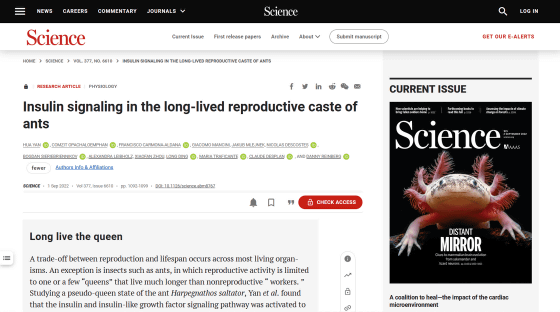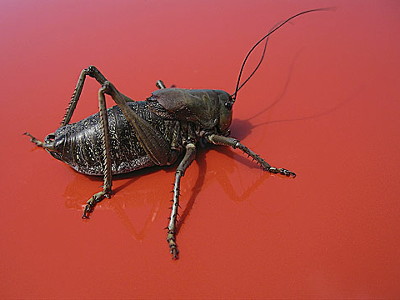The mystery of the mysterious ant that ``If the working ant wins the succession battle and becomes the queen ant, the life span is extended five times'' is revealed

by L. Shyamal
In many ants, the queen ant and the worker ant are separated at the time of birth, but a species called
Insulin signaling in the long-lived reproductive caste of ants |
https://doi.org/10.1126/science.abm8767

Anti-insulin protein linked to longevity and | EurekAlert!
https://www.eurekalert.org/news-releases/962705
These ant queens live 500% longer than workers. Now we know why. | Live Science
https://www.livescience.com/secret-to-pseudoqueen-ant-longevity
In Indian stag beetle ant colonies, when the previous queen ant dies, a fierce battle breaks out between worker ants for up to 40 days, and the winning individual is promoted to the next queen ant. A typical worker ant has a lifespan of about 8 months, but the lifespan of `` gamergates (gamer gate, surrogate queen) '' promoted from worker ants to queen ants is about 3 years and 3 months, which is actually 500 Life expectancy is likely to be extended by nearly 10%.
Because surrogate queens must consume large amounts of food to produce many eggs, they produce more insulin , which helps cells take up sugar for energy. However, some chain reactions caused by insulin contribute to the aging process, and increased insulin secretion is known to accelerate aging. For example, the insulin-activated Akt signaling pathway is associated with many cellular functions and has been linked to aging and age-related diseases.
Therefore, when a worker ant becomes a surrogate queen, insulin secretion increases, and theoretically it should accelerate aging and die earlier than a normal worker ant. However, in reality, the lifespan of the surrogate queen is 500% longer than the worker ant, and the trade-off that should exist is ignored, said Claude Desplan, a biologist at New York University, ``In these ants, The opposite is happening,” he said. Also, if the surrogate queen is moved to another colony where the queen already exists, it will be demoted from the queen ant to the worker ant this time, and the life span will be the same as that of a normal worker ant.
In order to elucidate the question ``Why can the queen ant (surrogate queen) of Indian stag beetle ant achieve longevity despite increased insulin secretion?'', Desplan et al. Tissues such as brains, ovaries, and fat were collected and analyzed from ants, surrogate queens, and former surrogate queens (individuals demoted from surrogate queens to worker ants). It seems that RNA sequencing was used for analysis and it was investigated what kind of protein is made in each tissue.

by Bert Holldobler
As a result of the analysis, it was found that much more insulin was produced in the brain of the surrogate queen than in worker ants and former surrogate queens, and vitellogenin and fat, which are precursors of egg yolk, began to be actively produced. These substances are transported to the ovaries to accelerate egg production, and some fat is used to produce pheromones secreted only by the queen and surrogate queen. When this pheromone disappears from the nest, worker ants fight over the position of the next queen ant.
In addition, when the surrogate queen secretes more insulin, it stimulates ovarian growth through a process called the MAPK signaling pathway . At the same time, the ovaries began to make a protein called Imp-L2 , which was found to block the Akt signaling pathway that accelerates aging.
'Two major insulin signaling pathways (the MAPK signaling pathway and the Akt signaling pathway) appear to differentially regulate fertility and longevity,' said Danny Reinberg, senior author of the paper. 'On the one hand, the increased signal helps the surrogate queen reproduce, and on the other hand, the reduced signal leads to longevity.'
The research team plans to investigate how Imp-L2 only blocks aging-related processes and not reproductive-related pathways. They also plan to examine the effects of insulin-blocking proteins in other insects and mammals, including fruit flies, but Desplan said, ``I don't know exactly what's going on.'' ``Flies and ants aren't alike. ”He pointed out that it is difficult to predict whether the anti-aging benefits of Imp-L2 will be passed on to other animals.
Related Posts:







